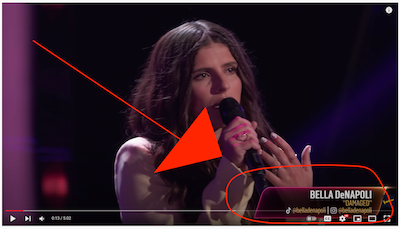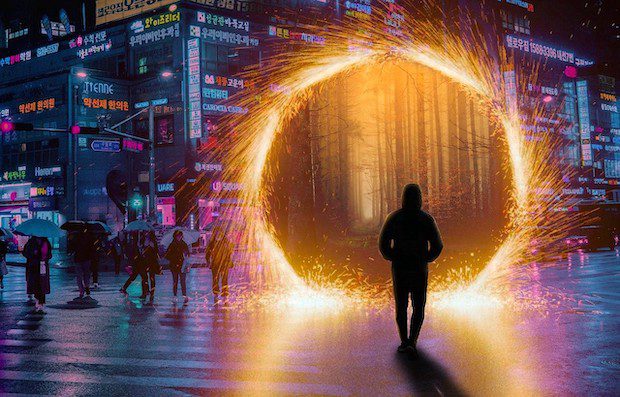Kelly Clarkson and “The Voice” tv show is a cheesefest.
And I love its cheesy goodness because I can’t sing. The other day I noticed something about the creators who sing on the show. They come to the studio in their best Sunday outfit. They shine their shoes. They do their hair. They put on Calvin Klein or Chanel Number 5 fragrance. And they sing their little hearts out. * Cries from the inspiration *
I watched carefully as each contestant sung. About halfway through a small box pops up at the bottom of the tv screen.

Did you see it? The singers who provide most of the value for The Voice tv show get their social media accounts promoted for about 3 seconds.
This happens once.
Below the Youtube video of the singer is a description — no links to the singer’s website. On the show’s website there used to be a singer bio for each contestant. Even then, zero links to the singer’s website. And now those bios are no longer on the show’s website.
Creators have been screwed for years. We’ve let monopolies do it to us.
The Web 3.0 transformation
Web 1.0: The internet
Web 2.0: Social media / mobile internet
Web 3.0: Blockchain / AI
— WellPaidGeek
We’re in the third phase of the internet. Many Web 3.0 skeptics argue that decentralization isn’t going to change anything. I disagree. The CEO of American company Coinbase, Brian Armstrong, argues Web 3.0 is nothing new. He says we’re re-decentralizing the web, which is how the internet was originally. Why?
Because he says we need to “check the power of big tech.” And because many countries are excluded from the creator economy boom. Ask creators like my friend Chinedu in Africa. They don’t have easy access to monetization through PayPal and Stripe. That’s taken for granted by people like me all the time. The luck of where you’re born shouldn’t affect whether you can join the creator economy and earn a living.
Creativity isn’t limited by country of origin. Web 2.0 makes us think it is.
The “take rate” explains the exploitation of creators
Social media platforms like Twitter, Instagram, and TikTok have take rates of 100% — they don’t share any revenue at all with creators! That’s been great for them but bad for users. — Chris Dixon
I will step in here and correct Chris. Twitter never used to share revenue with its creators until the CEO, Jack Dorsey, saw the power of Web 3.0. Now he’s backflipped. He’s publicly announced he will decentralize Twitter, turning it into a Web 3.0 product. Then there’s the Twitter superfollows feature that just launched and allowed creators to earn money from content.
Then there’s the new Revue newsletter function that allows creators to charge money for a paid newsletter. That’s not all. The best feature launched recently. Twitter is now crypto-friendly. You can send money over Twitter using Bitcoin. This is game-changing if you’ve ever tried to send money from the US to El Salavdore, for example. Twitter proves the migration to Web 3.0 will 100% happen, slowly.
Facebook, Instagram and TikTok, though, haven’t understood the shift. They make content creators work like slaves to build a following and get views that are controlled by an algorithm that can decide tomorrow it doesn’t like the color of your hoodie. They use that content to attract consumers and show them ads.
$0 from the ad revenue is shared with creators. Read that again.
When content platforms were new we were just happy to use them and not pay a dollar. Now we’re used to them. Our standards have changed. Creators want to share the revenue (fairly) that a platform makes off our content. Makes sense. But change won’t happen unless Zuckerberg is forced to sell ads and share the money, rather than buy another house.
If creators stop giving their content away for free then platforms like TikTok are bankrupt. Think about that.
Platform ownership is broken
What’s different about Web 3.0? Ownership. Creators want to own the platform they create on and have voting rights. When the platform makes money so do they.
When a content moderation policy needs to be formed, it’s done through voting rights via blockchain consensus and thousands of computers all around the world that force trust in the process (not even a presidential orange man could debate a blockchain election).
Then there are the platform’s features. Ever opened your favorite app for content on a nice Saturday afternoon to find that everything has changed and looks like it was designed by a freshman UI/UX kid? Feel like you didn’t see the design punch to the face coming? It’s not the kid’s fault. They’re too far removed from what creators do. They’re an outsider looking in.
Web 3.0 is different. Features are decided by the users in a democratic process. If one group of users don’t like it then they create a fork. A fork is where two versions of the same platform run but with different features.
When ownership is fixed and transparent the incentives change. Ownership then leads to user democracy rather than Web 2.0’s dictatorship philosophy of “here’s the latest update, ya filthy animal.”
Smart contracts enable the revolution
2000s: Make a website.
2010s: Build an app.
2020s: Deploy a smart contract.
— Sahil
Many people misunderstand the role of ethereum in the new creator economy. Ethereum allows smart contracts to be executed by machines, not humans.
Entrepreneur Mike Novogratz explains that “blockchain is going to allow information that shouldn’t be free, not to be free.” Remember Napster? You could download music for free and nobody, not even the sooks in the band Metallica, could stop you.
The Web 2.0 version of the internet we use right now isn’t built for content ownership. You can take any video off Youtube and steal it if you want. It’s hard to detect. Heck, this article could easily be stolen with a copy and paste.
Smart contracts change that. Smart contracts tell everybody who owns what content. The innovation of NFTs then turns your content into a portable digital asset you can publish anywhere on the internet.
The time is now for Web 3.0 only because of the divergence of these three things, according to expert Eric Jorgenson:
Web1 = Costless Publication
Web2 = Costless Communication
Web3 = Costless Transactions
More ways to monetize
Now that Web 3.0 fixes the content ownership problem and makes our digital assets portable, we can unlock more ways to make money as creators.
Mike Novogratz says we’re going to “see a shift from businessmen to creativity. Creators will have ways to monetize their creativity. Not just artistic creativity — all kinds of creativity.”
He even says we will wear NFTs on our t-shirts, and only with a pair of AR/VR glasses will another person be able to see them.
You’ll be able to split money with multiple parties. You’ll be able to transport your content from one platform to another based on which is treating you the best at the time. Creators from all around the world will be able collaborate and come up with crazy ways to earn money from our work.
No more $0 days on Facebook while Zucks gets rich. Money can be streamed to you by the second based on the performance of your content.
Creators will drive the acceleration to Web 3.0 because we simply want to get paid so we can do it full-time. Once the content captors release us, more ways to make money will overwhelm our creative brains. I can’t wait.
Web 3.0 changes every major industry
ETH: Decentralized Silicon Valley
DeFi: Decentralized Wall Street
NFTs: Decentralized Hollywood
— Sahil
The transformation isn’t unique to the creator economy. All industries will slowly change to reflect humanity’s obsession with democracy. Web 3.0 went after finance first and became a more than $2 trillion industry. The shift has moved to the creator economy with platforms like Bitclout inventing coins that allow creators to become stocks their audience can invest in.
The next wave will be decentralized Youtube, Spotify, and Facebook. Now is the best time to be part of the creator economy. Watch the transformation occur in front of your eyes and take whatever content type you love to Web 3.0. That’s how you take advantage of this awesome opportunity as a creator.
Join my email list with 50K+ people for more helpful insights.


